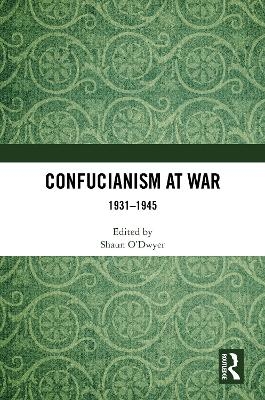
Confucianism at War
Routledge (Verlag)
978-1-032-61931-6 (ISBN)
- Lieferbar (Termin unbekannt)
- Versandkostenfrei innerhalb Deutschlands
- Auch auf Rechnung
- Verfügbarkeit in der Filiale vor Ort prüfen
- Artikel merken
In standard scholarship on the ideologies driving nation-building and imperialism during the era of Japanese expansionism that began in 1931, Confucianism is rarely referenced and relegated to the background. This volume brings together the work of scholars who argue for a revision of this standard view. It includes studies of Japanese, Chinese, colonial Manchurian and Korean intellectuals and reformers who contributed to expansionist, collaborationist or nationalist ideology-building during the war. Contrary to the assumption that Confucianism was an anachronism rendered irrelevant by the Westernising political reforms and revolutions of the early twentieth century, the chapters in this book show that Confucianism remained a potent, and also contested cultural resource for promoting national cohesion, war mobilisation and expansionism in East Asia between the Japanese invasion of Manchuria in 1931 and the end of World War II in 1945.
This book will appeal to scholars and students of Asian studies, nationalism studies, postcolonial studies, religious studies and philosophy. In particular, it is essential reading for those interested in nationalism and modern Confucian thought in East Asia.
Shaun O’Dwyer is a professor in the Faculty of Languages and Cultures at Kyushu University, Japan. His research focuses on philosophy and the history of ideas.
1. Introduction: Confucianism at War 1931–1945: A Background Discussion 2. On the Contextual Turn of Mencius’s “Kingly Way” in Wartime Japan (1931–45) 3. The Invention and Creation of the “Way”: The Shibunkai’s Discourse on the Kingly Way and Imperial Way after the Establishment of Manchukuo 4. Confucianism and Pan-Asianism in Modern Japan 5. Confucianism and Wartime State-Building in China: The Case of Filial Piety 6. The Shibunkai’s Confucian Diplomacy and the Flight of Kong Decheng 7. The Genealogy of Imperial Way Confucianism between Daitō Bunka Gakuin and the Shibunkai 8. Reconstructing the Nation: A Critique of Confucianism in Lee Gwang-su’s Political Thought 9. Gendered Independence and Submission: Wang Fengyi’s Moral Philosophy of Education and Manchukuo 10. Collaboration and Confucianism in Manchukuo, and in China under the Wang Jingwei Regime 11. A Grand Tour under the Empire’s Eye: Colonial Landscapes and Assimilation in Shionoya On’s Taiwan Travelogue 12. The Contradictions of Confucian Personalism: Yasuoka Masahiro and the Japanese Invasion of Asia (1931–1945) 13. Yamato Nadeshiko’s Loyalty to the State: Confucian Rhetoric for Japanese Women in Wartime (1937–1945) 14. From the Path of the Superior Person to Control of the Masses: The Revolution in the Rectification of Names and the Debate about Takada Shinji’s Rectification of Names 15. Confucianism, Nationalism, and Nihonjinron in Watsuji Tetsurō’s Climate
| Erscheinungsdatum | 28.11.2024 |
|---|---|
| Verlagsort | London |
| Sprache | englisch |
| Maße | 156 x 234 mm |
| Themenwelt | Geisteswissenschaften ► Philosophie ► Geschichte der Philosophie |
| Geisteswissenschaften ► Philosophie ► Philosophie der Neuzeit | |
| Geisteswissenschaften ► Religion / Theologie ► Weitere Religionen | |
| Sozialwissenschaften ► Soziologie ► Spezielle Soziologien | |
| ISBN-10 | 1-032-61931-7 / 1032619317 |
| ISBN-13 | 978-1-032-61931-6 / 9781032619316 |
| Zustand | Neuware |
| Haben Sie eine Frage zum Produkt? |
aus dem Bereich


